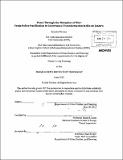| dc.contributor.advisor | Diane E. Davis. | en_US |
| dc.contributor.author | Tierney, Julia | en_US |
| dc.contributor.other | Massachusetts Institute of Technology. Dept. of Urban Studies and Planning. | en_US |
| dc.coverage.spatial | s-bl--- | en_US |
| dc.date.accessioned | 2012-10-10T15:49:33Z | |
| dc.date.available | 2012-10-10T15:49:33Z | |
| dc.date.issued | 2012 | en_US |
| dc.identifier.uri | http://hdl.handle.net/1721.1/73830 | |
| dc.description | Thesis (M.C.P.)--Massachusetts Institute of Technology, Dept. of Urban Studies and Planning, 2012. | en_US |
| dc.description | "June 2012." Cataloged from PDF version of thesis. | en_US |
| dc.description | Includes bibliographical references (p. 78-84). | en_US |
| dc.description.abstract | The history of the military police in Rio de Janeiro is a history of violence. Police violence peaked during the democratic era when they have killed more civilians annually than the total disappeared during the military dictatorship. Their violence unduly targets the urban poor, those living in favelas, where poverty intersects with informality, where insecurity manifests in unprotected spaces, from inadequate infrastructure to lack of land title; from stigmatization as territories of criminality to violence as drug traffickers and militias battle each other, and the military police, for control. The pacification police are an attempt to reverse this history. The pacification police are the most prolific and contentious public security policy in Rio de Janeiro's recent history. Their official objective is to restore security to spaces once governed by armed criminals. But while pacifying the informal settlements they are also pacifying the military police. As the state on the streets, or its most visible aspect in the informal settlements, they are the locus of community concerns and interlocutors with public authorities. The pacification police are altering perceptions of the police in the eyes of residents and reforming what it means to be a law enforcement officer in the minds of police. They are unintentionally connecting a state that was distant from the informal settlements and complicit in the violence inside them to the urban poor. The pacification police are beginning to transform urban governance across Rio de Janeiro. | en_US |
| dc.description.statementofresponsibility | by Julia Tierney. | en_US |
| dc.format.extent | 84 p. | en_US |
| dc.language.iso | eng | en_US |
| dc.publisher | Massachusetts Institute of Technology | en_US |
| dc.rights | M.I.T. theses are protected by
copyright. They may be viewed from this source for any purpose, but
reproduction or distribution in any format is prohibited without written
permission. See provided URL for inquiries about permission. | en_US |
| dc.rights.uri | http://dspace.mit.edu/handle/1721.1/7582 | en_US |
| dc.subject | Urban Studies and Planning. | en_US |
| dc.title | Peace through the metaphor of war from police pacification to governance transformation in Rio de Janeiro | en_US |
| dc.title.alternative | From police pacification to governance transformation in Rio de Janeiro | en_US |
| dc.type | Thesis | en_US |
| dc.description.degree | M.C.P. | en_US |
| dc.contributor.department | Massachusetts Institute of Technology. Department of Urban Studies and Planning | |
| dc.identifier.oclc | 811562440 | en_US |
